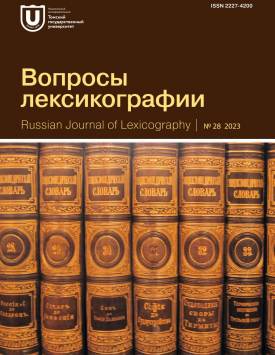On the research potential of lexicographic complexes of folklore texts
The article deals with the lexicographic complexes of folklore texts and their research potential. The structure of the complexes and the principles of their creation are described. Each component of the complex is briefly characterized: folklore megatext, alphabetical frequency glossary, word list and concordance. The folklore megatext is viewed as a unified text that combines specific passportized texts related by genre and spatiotemporal characteristics. The alphabetical frequency glossary includes all megatext lexemes, arranged in alphabetical order, indicating the frequency of each word. It is created by means of a special computer program NewSlov. The word list represents language units in a descending order of frequency, and the concordance is an alphabetical list of all the words of the folklore megatext with the contexts of their usage. The basis of the first complexes was the collection The Great Russian Folk Songs. The choice was due to the authority of the collection, in which the texts are systematized according to the topical principle and are accompanied by the indication of the territory and the time of their recording. With the complex “Voronezh” as an example, the author shows that each component of the complex has an independent research value for studying the language of folklore of a particular genre and region. She emphasizes that the availability of different complexes created by the same research team based on the same principles allows carrying out comparative studies to identify the genre and territorial specificity of the folklore language. Certain examples demonstrate the opportunities of a comparative analysis of word lists of different folklore genres (non-ritual lyrics, epics, fairy tales), individual word-formation families (with the root skor- and sovet-) and even specific lexemes (adjective khudoy). The author concludes that lexicographic complexes bear high research potential. They combine focus on each linguistic phenomenon with attention to all the material and turn out to be a reliable instrument for solving urgent issues of linguistic studies of folklore related to the specifics of the language of different genres of folklore, territorial differentiation and idiolectic nature of folk song language. In addition, lexicographic complexes become a certain platform for creating dictionaries of various types, among which the already tested experimental forms stand out: contrastive dictionaries and dictionaries of a single word. The prospects for further lexicographic work are outlined. They are connected with the expansion of the source base of complexes of folklore texts and the application of this idea in authorial lexicography. The author declares no conflicts of interests.
Keywords
folklore language, dictionary, folklore lexicography, lexicographic complex, concordanceAuthors
| Name | Organization | |
| Bobunova Mariya A. | Kursk State University | bobunova61@mail.ru |
References

On the research potential of lexicographic complexes of folklore texts | Voprosy leksikografii – Russian Journal of Lexicography. 2023. № 28. DOI: 10.17223/22274200/28/3
